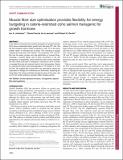Files in this item
Muscle fibre size optimisation provides flexibility for energy budgeting in calorie-restricted coho salmon transgenic for growth hormone
Item metadata
| dc.contributor.author | Johnston, I.A. | |
| dc.contributor.author | Garcia de la Serrana Castillo, Daniel | |
| dc.contributor.author | Devlin, R.H. | |
| dc.date.accessioned | 2014-11-19T11:31:02Z | |
| dc.date.available | 2014-11-19T11:31:02Z | |
| dc.date.issued | 2014-10-01 | |
| dc.identifier | 157758108 | |
| dc.identifier | 03de10e3-ddcf-487c-b682-57acab99dec0 | |
| dc.identifier | 84908542364 | |
| dc.identifier | 000342506700008 | |
| dc.identifier.citation | Johnston , I A , Garcia de la Serrana Castillo , D & Devlin , R H 2014 , ' Muscle fibre size optimisation provides flexibility for energy budgeting in calorie-restricted coho salmon transgenic for growth hormone ' , Journal of Experimental Biology , vol. 217 , no. 19 , pp. 3392-3395 . https://doi.org/10.1242/jeb.107664 | en |
| dc.identifier.issn | 0022-0949 | |
| dc.identifier.other | ORCID: /0000-0002-7796-5754/work/47136038 | |
| dc.identifier.uri | https://hdl.handle.net/10023/5798 | |
| dc.description | The study was supported by the Marine Alliance for Science and Technology for Scotland (Scottish Funding Council grant HR09011) and by the Canadian Biotechnology Strategy (to R.H.D.). Deposited in PMC for immediate release | en |
| dc.description.abstract | Coho salmon (Oncorhynchus kisutch) transgenic for growth hormone (GH) show substantially faster growth than wild-type (WT) fish. We fed GH-transgenic salmon either to satiation (1 year; TF) or the same smaller ration of wild-type fish (2 years; TR), resulting in groups matched for body size to WT salmon. The myotomes of TF and WT fish had the same number and size distribution of muscle fibres, indicating a twofold higher rate of fibre recruitment in the GH transgenics. Unexpectedly, calorie restriction was found to decrease the rate of fibre production in transgenics, resulting in a 20% increase in average fibre size and reduced costs of ionic homeostasis. Genes for myotube formation were downregulated in TR relative to TF and WT fish. We suggest that muscle fibre size optimisation allows the reallocation of energy from maintenance to locomotion, explaining the observation that calorie-restricted transgenics grow at the same rate as WT fish whilst exhibiting markedly higher foraging activity. | |
| dc.format.extent | 4 | |
| dc.format.extent | 426948 | |
| dc.language.iso | eng | |
| dc.relation.ispartof | Journal of Experimental Biology | en |
| dc.subject | Growth | en |
| dc.subject | Myotube formation | en |
| dc.subject | Transgenesis | en |
| dc.subject | Optimal fibre size hypothesis | en |
| dc.subject | QH301 Biology | en |
| dc.subject.lcc | QH301 | en |
| dc.title | Muscle fibre size optimisation provides flexibility for energy budgeting in calorie-restricted coho salmon transgenic for growth hormone | en |
| dc.type | Journal article | en |
| dc.contributor.institution | University of St Andrews. School of Biology | en |
| dc.contributor.institution | University of St Andrews. Marine Alliance for Science & Technology Scotland | en |
| dc.contributor.institution | University of St Andrews. Scottish Oceans Institute | en |
| dc.contributor.institution | University of St Andrews. Centre for Research into Ecological & Environmental Modelling | en |
| dc.identifier.doi | 10.1242/jeb.107664 | |
| dc.description.status | Peer reviewed | en |
This item appears in the following Collection(s)
Items in the St Andrews Research Repository are protected by copyright, with all rights reserved, unless otherwise indicated.

